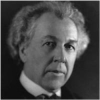Evan Esar

Evan Esar
Evan Esarwas an American humorist who wrote "Esar's Comic Dictionary" in 1943, "Humorous English" in 1961, and "20,000 Quips and Quotes" in 1968. He is known for quotes like "Statistics: The only science that enables different experts using the same figures to draw different conclusions." He also wrote The Legend of Joe Miller, which was privately printed for members of the Roxburghe Club of San Francisco by the Grabhorn Press in 1957...
NationalityAmerican
ProfessionWriter
CountryUnited States of America
thinking-about-you vanity people
Egocentricity: The vanity that makes you wonder what people are thinking about you when they are really wondering what you are thinking about them.
together egotism egocentric
Egocentric: A person who has his I's too close together.
lying writing successful
The secret of successful writing lies in striking the right keys on the typewriter.
teaching subjects lecturer
The lecturer who is full of his subject is usually very slow in emptying himself.
country home men
A home in the country is what a city man hopes to buy and a farmer hopes to sell.
successful want chance
If you want to be successful, you must either have a chance or take one.
common-sense stupidity kind
There's only one kind of common sense but a thousand varieties of stupidity.
common-sense common form
The most uncommon form of intelligence is common sense.
flower perfume charm
Charm is to a woman what perfume is to a flower.
morning coffee wife
The first requisite for a good cup of coffee in the morning is to get your wife out of bed.
men age chess
Age brings wisdom to some men, and to others chess.
men car care
Some men take good care of a car; others treat it like one of the family.
charming ready another-woman
A woman is always ready to describe another woman as charming, but only if the other woman is not charming.
men competition mind
The reason why men who mind their own business succeed is that they have so little competition.